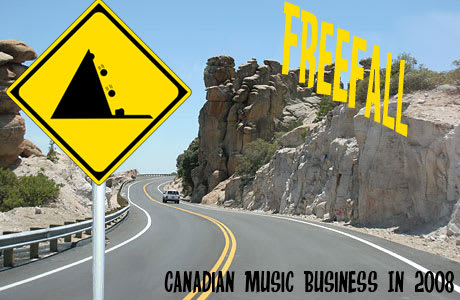Reporting on the state of the music business, this column has had occasion to note over the last year or two that the arse was pretty much out of er. The end was nigh. The music business was in freefall. Looking at trends and events from 2008, we now gingerly report that the crashing music sector appears to have reached terminal velocity. But wait, thats sort of good news! Terminal velocity, see, is what happens when the downward force of gravity meets the upward force of drag, thus causing the falling object to, well, stop falling and just kind of hang there looking foolish. Okay, never mind that its mathematically impossible. But since we havent yet hit the bottom quite yet, lets just go with the metaphor as we review some of the major upward and downward forces that confronted the Canadian music business this year.
At the awful end of the spectrum, traditional retail music sales continued to tank, causing several independent distributors and retailers to bow out. Landwash Distribution out of St Johns announced in May that it was winding down, leaving a rather large hole on the East coast. On the West coast, Festival Distribution closed its doors to physical distribution in July (it continues with digital sales) and the retailer A&B Sound went down. Whats left of Canadian music retailers is a handful of small but fierce little shops in cities across the country, plus HMV (whose DVD-to-CD ratio has gone up enormously). And WalMart. And gas stations. So, when you want to buy a CD rather than a download, you really have to work for it.
Stephen Harper took a moment to kick the music business while it was down, cutting $45 million in federal funding to the arts. The cuts took out the PromArt program, which supplied tour support to Canadian bands, and the Trade Routes program, which supported the development of international markets for Canadian cultural products. Cuts to the arts became a bit of an issue in the ensuing federal election (remember that?), but the Canadian music industry as a whole failed to stand up for itself in any kind of concerted way. Except, of course, in Quebec where people give a damn about their own culture. In the end, we voted in yet another minority Conservative government with no news as to whether or how funding will be reinstated.
Major labels generally fared poorly and had no significant breakout Canadian hits other than that Kardinal Offishall single and they bollixed the album release by waiting too long after the single hit its apex. The Canadian majors "attack of the clones strategy sign mediocre act, spend buckets of money on billboards and TV promo hoping theyll catch on at the mall does nothing for the long-term development of artists, the industry, or the relationships between consumers and music. We do not need more Hedleys or illScarletts. Yes, they sell records to kids. But they also ruin kids ears, make them lazy, and pollute the musical environment.
We do need more Shads and Dog Days and Chad VanGaalens and Amelia Currans. Artists like these, and the independent sectors that support them, are the musical equivalent of the slow-food movement: locally sourced, community-supported micro-productions that give us higher-nutrient, better tasting music. Canadian indie music is more colourful, less of a drain on resources (in this climate a $5,000 tour grant goes way further than $50,000 in ad buys) and contributes to the national cultural identity; and when indie artists die, they tend to go back to the soil, regrow, and regroup rather than burn out before they hit 30.
The lack of a star system in Canada has made it tough in the past to connect artists to casual listeners, but that hole got a little smaller this year thanks to the continued emergence of the Polaris Music Prize and the support of mainstream media. Short-listed artists find their profiles and sales getting a real boost. Sales of Andorra, from this years winner Caribou, reportedly jumped 400 percent after the win was announced. Turns out people will buy critically acclaimed music rather than pap they just need to get pointed to it.
Another updraft for Canadian music (except perhaps for the symphonic) was the rebrand of CBC Radio 2. Adding to the solid gold support of CBC Radio 3 and the well-meant if stentorian efforts of Radio 1, Radio 2s switch from mainly classical and jazz-focused programming to a more eclectic, culturally diverse, indie-friendly mentality was unpopular with some listeners, but shows CBC Radio to be a genuinely committed supporter of current Canadian culture. In digital news, music sales have not made up anywhere close to lost retail ground, and Canada hasnt caught up to the U.S. in terms of digital sales overall. But at least all relevant players in the industry have accepted that DRM is a no-go. In fact a couple of former sellers of DRM-laden music files disgraced themselves by announcing that they would no longer offer tech support for legally purchased products. WalMart initially made that announcement but then backed down when it was pointed out by irate consumers that they paid for the damn files.
The interesting thing about the DRM-support bailout is that it shows that the industry has accepted unrestricted file transferability as what consumers demand, and therefore as what should be the standard. This is a huge challenge to the prevailing conception of copyright. So, if consumers are going to be able to move and enjoy music files all over the place, one of two things is going to happen: either were going to have to change our thinking about what is copyright-infringing behaviour, or copyright "crime is going to make a lot of lawyers very rich.
Very sadly, the federal government appears to be going with Option B. The proposed new copyright bill, ignoring the fact that consumers are just as important a market force as suppliers, creates a whack of new criminal offences likely to result from such mundane behaviour as dumping a tune from your phone onto your computer. Its a bass-ackward piece of legislation that we can only hope will languish and die now that the feds are concerned with more pressing financial crises. FYI, both the Canadian Recording Industry Alliance (CRIA, which represents the majors) and the Canadian Independent Record Producers Association (CIRPA) have endorsed the new bill. Boo. Attempting a progressive stance are proponents of ISP-based levies for "all you can eat music. The theory is that ISPs would charge customers a flat monthly fee, which would then go into a big pool and distributed according to a formula that is remarkably similar to the quantum of non-baryonic dark matter in the universe. Its a start.
But glowering over that ray of hope is a great brewing struggle on the issue of net neutrality. Canadian ISPs have been actively and in some cases aggressively shaping available bandwidth according to content away from P2PO users, say and thats bad news for musicians. Why? Because musicians and their fans are moving huge amounts of content like videos and music files around, and in spite of what the headlines say, a lot of it is legal and consensual. If ISPs are allowed to prefer content, whats to stop them essentially selling guaranteed broadband to people who can pay, and squeezing out those who cant? So: falling sales, industrial reticence, backwards legislation, grabby ISPs and industry apathy (I am looking at you, artists) all threaten to drive the music business into the ground. It seems like sheer hope and the simple love of music are keeping the thing afloat. Luckily, no matter how crappy things in the business get, artists and their fans will find each other. In 2009, the way forward is to begin all business propositions working with that fact.
At the awful end of the spectrum, traditional retail music sales continued to tank, causing several independent distributors and retailers to bow out. Landwash Distribution out of St Johns announced in May that it was winding down, leaving a rather large hole on the East coast. On the West coast, Festival Distribution closed its doors to physical distribution in July (it continues with digital sales) and the retailer A&B Sound went down. Whats left of Canadian music retailers is a handful of small but fierce little shops in cities across the country, plus HMV (whose DVD-to-CD ratio has gone up enormously). And WalMart. And gas stations. So, when you want to buy a CD rather than a download, you really have to work for it.
Stephen Harper took a moment to kick the music business while it was down, cutting $45 million in federal funding to the arts. The cuts took out the PromArt program, which supplied tour support to Canadian bands, and the Trade Routes program, which supported the development of international markets for Canadian cultural products. Cuts to the arts became a bit of an issue in the ensuing federal election (remember that?), but the Canadian music industry as a whole failed to stand up for itself in any kind of concerted way. Except, of course, in Quebec where people give a damn about their own culture. In the end, we voted in yet another minority Conservative government with no news as to whether or how funding will be reinstated.
Major labels generally fared poorly and had no significant breakout Canadian hits other than that Kardinal Offishall single and they bollixed the album release by waiting too long after the single hit its apex. The Canadian majors "attack of the clones strategy sign mediocre act, spend buckets of money on billboards and TV promo hoping theyll catch on at the mall does nothing for the long-term development of artists, the industry, or the relationships between consumers and music. We do not need more Hedleys or illScarletts. Yes, they sell records to kids. But they also ruin kids ears, make them lazy, and pollute the musical environment.
We do need more Shads and Dog Days and Chad VanGaalens and Amelia Currans. Artists like these, and the independent sectors that support them, are the musical equivalent of the slow-food movement: locally sourced, community-supported micro-productions that give us higher-nutrient, better tasting music. Canadian indie music is more colourful, less of a drain on resources (in this climate a $5,000 tour grant goes way further than $50,000 in ad buys) and contributes to the national cultural identity; and when indie artists die, they tend to go back to the soil, regrow, and regroup rather than burn out before they hit 30.
The lack of a star system in Canada has made it tough in the past to connect artists to casual listeners, but that hole got a little smaller this year thanks to the continued emergence of the Polaris Music Prize and the support of mainstream media. Short-listed artists find their profiles and sales getting a real boost. Sales of Andorra, from this years winner Caribou, reportedly jumped 400 percent after the win was announced. Turns out people will buy critically acclaimed music rather than pap they just need to get pointed to it.
Another updraft for Canadian music (except perhaps for the symphonic) was the rebrand of CBC Radio 2. Adding to the solid gold support of CBC Radio 3 and the well-meant if stentorian efforts of Radio 1, Radio 2s switch from mainly classical and jazz-focused programming to a more eclectic, culturally diverse, indie-friendly mentality was unpopular with some listeners, but shows CBC Radio to be a genuinely committed supporter of current Canadian culture. In digital news, music sales have not made up anywhere close to lost retail ground, and Canada hasnt caught up to the U.S. in terms of digital sales overall. But at least all relevant players in the industry have accepted that DRM is a no-go. In fact a couple of former sellers of DRM-laden music files disgraced themselves by announcing that they would no longer offer tech support for legally purchased products. WalMart initially made that announcement but then backed down when it was pointed out by irate consumers that they paid for the damn files.
The interesting thing about the DRM-support bailout is that it shows that the industry has accepted unrestricted file transferability as what consumers demand, and therefore as what should be the standard. This is a huge challenge to the prevailing conception of copyright. So, if consumers are going to be able to move and enjoy music files all over the place, one of two things is going to happen: either were going to have to change our thinking about what is copyright-infringing behaviour, or copyright "crime is going to make a lot of lawyers very rich.
Very sadly, the federal government appears to be going with Option B. The proposed new copyright bill, ignoring the fact that consumers are just as important a market force as suppliers, creates a whack of new criminal offences likely to result from such mundane behaviour as dumping a tune from your phone onto your computer. Its a bass-ackward piece of legislation that we can only hope will languish and die now that the feds are concerned with more pressing financial crises. FYI, both the Canadian Recording Industry Alliance (CRIA, which represents the majors) and the Canadian Independent Record Producers Association (CIRPA) have endorsed the new bill. Boo. Attempting a progressive stance are proponents of ISP-based levies for "all you can eat music. The theory is that ISPs would charge customers a flat monthly fee, which would then go into a big pool and distributed according to a formula that is remarkably similar to the quantum of non-baryonic dark matter in the universe. Its a start.
But glowering over that ray of hope is a great brewing struggle on the issue of net neutrality. Canadian ISPs have been actively and in some cases aggressively shaping available bandwidth according to content away from P2PO users, say and thats bad news for musicians. Why? Because musicians and their fans are moving huge amounts of content like videos and music files around, and in spite of what the headlines say, a lot of it is legal and consensual. If ISPs are allowed to prefer content, whats to stop them essentially selling guaranteed broadband to people who can pay, and squeezing out those who cant? So: falling sales, industrial reticence, backwards legislation, grabby ISPs and industry apathy (I am looking at you, artists) all threaten to drive the music business into the ground. It seems like sheer hope and the simple love of music are keeping the thing afloat. Luckily, no matter how crappy things in the business get, artists and their fans will find each other. In 2009, the way forward is to begin all business propositions working with that fact.




